Eileen recruited bishops and religious leaders, men and women, from different denominations to form SHARE’s advisory board and set up strong local chapters in cities across the country to form a strong team. She built a strong staff that included Teri Chin, Paul Scire, Sister Margaret Sullivan, Jean Stokan, Kathleen Kenny, Barbara Schaible, Locke Schultz, Anne Carrabino, Sheril Brennan and Mike Hoffman. SHARE launched a sister-parish program, matching parishes from the United States with parishes in El Salvador.
From 1987-1991 SHARE and the Interfaith Office on Accompaniment organized the “Going Home” Campaign. A year earlier, in 1986, we had visited the Calle Real Refugee Camp, a project of the Archdiocese of San Salvador on the outskirts of the city. We took testimony of the massacres by the government. We accompanied the displaced people at Calle Real to re-populate San Jose Las Flores. They planted the seed of accompanying their relatives in the UN (United Nations) refugee camps in Mesa Grande, Honduras, to return home. Many of the refugees had fled massacres and saturation bombing which was part of the U.S. military strategy in El Salvador. The UN set up refugee camps consisting of rows and rows of white tents on dusty white plane (Mesa Grande translates to Great Table), which quickly became highly militarized settings under the close vigilance of the Honduran military. Movement in and out of the camps was highly guarded. Conditions, though better than the war-ravaged countryside, were challenging. SHARE had been supporting the Mesa Grande refugees since 1981 by raising awareness about their plight and their resistance to government threats to permanently relocate them further away from El Salvador.
When the Mesa Grande refugees learned of repopulation efforts by their relatives from the Calle Real Refugee Camp in San Salvador, they too began to dream of returning home to reclaim their land and demand peace. The repatriation movement was born. In 1987 refugees in the United Nations sponsored refugee camps in Mesa Grande, Honduras, declared their intent to return to their homes of origin and asked the SHARE Foundation and the Interfaith Office on Accompaniment to accompany them. It was a tall order. The repatriation was opposed not only by the UNHCR (UN High Commission of Refugees) but by the Salvadoran, Honduran and U.S. governments and militaries. After a great deal of consultation with the refugees and the interfaith leadership in the region, SHARE under the leadership of Eileen, Lutheran pastor, Gus Schultz, and I organized the accompaniment of 20,000 refugees back to El Salvador from Mesa Grande Refugee Camp in Honduras. We called it “The Going Home” Campaign.
We mobilized a blue ribbon committee of religious leaders from across the country and from the sanctuary movement. We organized delegations that accompanied each wave of refugees crossing the border to recover their land and their lives. This accompaniment by lay and religious men and women across the border and in repopulated communities in the face of threats by the various governments and militaries and opposition of the UNHCR changed lives. Monsignor Urioste described such solidarity as an extra lung – “you help us breathe.” During one of the early repatriations, one young woman from the refugee camp told us as military helicopters hovered overhead and machine guns were turned on the refugees and our delegation, “We have God, we have each other, and we have you.” At one border crossing, a refugee asked Lutheran Pastor Gus Schultz for a blessing of the buses. He responded, “Yes, but only after you bless us.” Refugees drew strength from our accompaniment. Delegates’ lives were transformed by their faith and courage. A powerful relationship/covenant was established. When delegates returned, we bombarded the press, the Congress, and our congregations with what we learned. We shared the stories and fought for the refugees and their right to repatriate. We mobilized political and moral support. From 1987-1991 hundreds of people of faith participated in “The Going Home” Campaign.
SHARE launched a campaign entitled “One Million Seeds of Hope. The goal was to raise one million dollars to help the refugees rebuild from the ashes. We coordinated closely with DIACONIA, the Archdiocese of San Salvador, the Lutheran Church of El Salvador, and the Episcopal Diocese. We raised over $1 million for reconstruction for the 20,000 refugees to return from Honduras.
The role of the “Going Home” campaign was a precursor to the role the Red Cross and United Nations now play in similar situations. We established a standard that no one should live in a refugee camp longer than seven years. After that point it is impossible for the person to be self-sufficient. After seven years the camps breed dependency. Salvadorans wisely wanted to return home, but they wanted to go at the wrong time and to the wrong places, their own communities. Those details all needed to be re-defined, worked out, and organized. Going home in the middle of the war was an impossible dream. The “Red Sea” of the armies from Honduras, El Salvador, and the U.S., had to be parted. The farmers wanted to go home to be farmers. The children wanted to know what a river looks like or a mango tree. They wanted to make their contribution to end the war and use their bodies to stop the bombs. After four repatriations they got home. They had to rebuild from scratch. Little by little a whole city was emerging with houses, community centers, schools, clinics, water systems, roads, and everything that was needed.
Solidarity from all over the world was pouring in by the early 1990s. We sent hundred of delegates to accompany the reconstruction. These delegates were falling in love with each community and sister relationships were developed. Sister relationships have lasted 20 and 25 years.

A Mango Tree
Today 25 years later when I visit the communities and meet with the leadership, many of the women like Esperanza, Maria Chichilco, Violeta Menjivar, and Carmen Elena, we share the stories of going home. We tell the stories to their sons and daughters now grown up leaders who were babes in arms on those buses crossing the border returning to their “Promised Land.” We were on the same bus accompanying each other. Elena Jarmillo from the Sisters of St. Joseph of Orange accompanied the re-population of Las Flores and she was invited to stay for a few months. Twenty-seven years later she is still there walking with the people.
El Salvador had the vision to organize and include the U.S. in terms of a very well-coordinated solidarity support from farmers to students to religious groups. Each were tasked with specific assignments. Say you have a number of seeds and throw them in many directions. Not all of them live, but the seeds land in many places and some find conditions to allow growth and bear fruit. In the U.S. conditions were rich on the receiving end and with a little water, the seeds grew into things like the sanctuary movement and the “Going Home Campaign,” is an example.
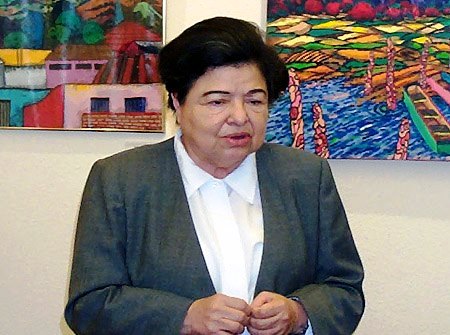
Maria Julia Hernandez
Eileen, Gus Schultz, Barbara Schaible, and I attended the installation of the national Peace Commission in El Salvador in 1992. We participated in the march to the Plaza where I stopped to pause and mourn for the many lives that were lost. We danced and toasted to the end of the war.
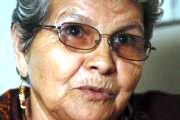
Madre Guadalupe Mejia
Eileen left SHARE a powerful organization with national and international recognition in 1992. That same year I became Program Director. In 1995 I became its new Executive Director. After the Peace Accords we did not imagine that the conservative Arena Party was going to stay in power for another 20 years or that violations of human rights would continue and free trade policies of hunger were going to rule. I learned from the head of Tutela Legal, and Madre Guadelupe Mejia of the Mothers of the Disappeared, two of my mentors, the importance of truth, justice, and reparations to the victims as a necessary element for community and human development. Without the truth can there be justice? How does one move into forgiveness? Who do we forgive if we don’t solve our issues from the past? We will not be able to solve the level of violence we currently have. The current 10-15 assassinations per day could be connected to the impunity of the war years. We need to resolve our problems from our past. We need to facilitate a middle way between the perpetrators and the families of the victims. We must learn from the reconciliation of Nelson Mandela’s South Africa. It’s like having a brother you have an underlying conflict with, but you have to go to Thanksgiving dinner and embrace one another and pretend everything is fine; however, there is this tiny little or great edge there that you both know is a conflict you live with. Let’s resolve it before you die or sooner if possible so you don’t live your life with that burden.
Today in El Salvador reconciliation is happening but very, very slowly. What I want to do next is gather more testimonies of more people before those stories are lost. I want to get the views of both sides. How do the countless relatives of the disappeared feel today? How does the mother of a guerrillero or guerrillera who never returned understand what happened? How does the mother who lost her son to the guerrillas feel? Many families had children that went to opposite sides. It didn’t matter which side they were on when the sons and daughters did not return home. Grief does not discriminate. Healing is important in order to move forward.
Another issue we are addressing is the need for citizenship for over 200,000 Salvadorans in the U.S. with Temporary Protective Status (TPS). The vast majority of Salvadorans with TPS have been in the U.S. for over 12 years. They are complying with all the laws, sending their kids to school, and being great citizens with all the responsibilities and none of the rights. We ask President Obama to give them citizenship. That will enable them to travel to El Salvador to see their families. Their only option now is to skype their families by computer. The smell of beans cooking over an open fire does not transmit by skype. We did it with the Sanctuary Movement already for the refugees of the war in 1996. In 2012 I co-led the Residency Now Campaign for Central Americans with TPS.
At the end of the war much of the human rights work was de-funded. But the SHARE Foundation survived and thrived, building off the work during the war years and the strong relationships, institutional and personal, in El Salvador and across the United States. Post -war reconstruction and community development became a focus including projects providing food security, women and youth leadership developing, women’s rights, and more. These were important but as the sole survivor of the El Mozote massacre, Rufina Amaya, said, “Even when the government fulfills your basic needs of water and power, you still wake up at 3 AM remembering what happened and seeing the images of the dead bodies in your mind over and over again. And still no one returns to say they are sorry.” Looking at other countries that have endured wars and hardships, I am well aware that there is often a 30-50 year cycle for justice to be admitted and change to take place. That has been true in Chile, Spain, Argentina, Uruguay, and Paraguay. At least President Funes did admit that yes, these things did happen. It is a start. Justice and reparations for the victims have to follow. Another impossible dream is to hold the U.S. government accountable for sponsoring and directing the war.
We have accompanied our people as they seek truth, justice, and reparations, at the same time. There is a powerful song I like that says, “ Vamos Con Alegria, Cantando Vamos Con Alegria.” It is like the young woman that was in the train to be killed by the Nazis and threw a piece of paper out the window that read, “Tell them they were singing.” We support hopeful communities, flowers that are singing con alegria.”
One of the most powerful tools SHARE has discovered in keeping long-term commitments with the Salvadorans is sending delegations into the country to experience the reality there. You can’t just send a check; that is good but not sufficient. People need to turn off their I-Pads and have a human connection. We generally send a few hundred people a year to experience El Salvador. We try to choose communities that have not received visitors before. It is a good experience for the host community to receive visitors. It is an eye-opening experience for the visitors who are being educated. They will stay connected to El Salvador in some way for the next 10, 20, 30 years. It becomes a pivotal moment of the participant’s life. I’ve dedicated my life to delegations because it’s easier for the delegate to explain things in El Salvador than for a Salvadoran neighbor to explain them. I frequently thank a delegate for explaining an issue such as poverty to me because he can do it from a different perspective and open my eyes to see it in a different way. It’s like in the Bible where the prophet is never from his own country but appears at the well explaining things to the locals very clearly. We have sent over 10,000 delegates from the U.S. to El Salvador over the last three decades.
Among our delegates was a family whose young daughter was murdered by a serial killer. He had killed seventeen young women. The family had frozen in time unable to do anything until they met the mothers of the disappeared here in El Salvador who were organized and supportive of one another and searching for the missing. The family asked the Salvadoran mothers, “How can you do what you do? How can you be so hopeful?” The mothers responded, “Because we cannot NOT do it. If we stop searching, we become depressed. If we find our own kids, we then search for someone else’s kids; we are a family, a network.” This family returned to the States and found their daughter’s killer. He was found guilty and condemned 17 times for the serial murders. They fought against the death penalty but sought mental health treatment for him instead, knowing he was sick. They formed a national network to help other families in similar situations. In this case the delegation to El Salvador became a new way of moving forward in their lives. We advance one person at a time, and you never know who that will be or in what way she or he will be impacted. We are helping each other. Delegates gain much from walking with the organized poor.
Many young people work for us for a few years and then return to attend graduate school or to get a job. When they leave SHARE, they continue to work on behalf of El Salvador for years. One of the roles we see ourselves playing is to be a university for young people who will stay connected with El Salvador for the rest of their lives.
Right now we are beginning to pioneer solidarity with the Salvadoran LGBT community that is in great physical danger. Supporting this group is revolutionary for us and we might even lose a good portion of our base, but if you compare the 1980s and the death squads with the persecution to this community, it is equivalent. Our approach is from a human rights standpoint alone. Rubi, the transgender woman, is often persecuted and condemned because the community does not know her story. The government under President Funes could have investigated 149 hate crimes and did not. Legislation needs to pass against homophobic crimes. For the LGBT community we are asking for respect for their basic rights. We condemn the killings. Eileen and I had an idea to launch a Romero Foundation in 1999 to celebrate his 20th anniversary. The proposal was well received in El Salvador. The first Board of Directors included Monsignor Ricardo Urioste, Maria Julia Hernandez, Rev. Robert McKenzie, Father Chema Tojeira, Eileen Purcell, and myself. The next big event will be in 2017 for his 100th anniversary celebration. We would like to celebrate and declare 2017 the Year of Peace and Reconciliation. We want to work with the youth and demand from the governments of the U.S. and El Salvador reparations for the victims.
Another program in which I would like to invest my time is connecting generations that grew up here in the U.S. with their homeland in El Salvador. The Jewish community has done a very good job of connecting their people back to their homeland with programs. You have to facilitate it with funds to support low-income kids. This would be a different generation than the one who experienced the war. This generation would not speak Spanish. We would need to find activities that are attractive to them. This current generation in the U.S. doesn’t know much of its own Salvadoran heritage or culture. For example, they don’t know the 20 dishes you eat during Holy Week, such as mangoes en miel. They don’t know the beverages you drink during Christmas, the chocolate that used to be the drink of the gods. They would need to be introduced to the political dimension. They could learn what their counterparts are doing – are they in gangs or working at Walmart? We need to share the stories of the Matanza in 1932, the story of their grandmothers, Mayans, and how they endured the colonizers from Spain that attempted to destroy their language, take away their gods and who eliminated 97% of the population.
It is rewarding when your ideas click and when others support them. I recognize that a project’s success is a matter of chemistry in how a leader or team is directing a project. Conditions must be right for projects to work. I have learned that our contributions to change the world are small, and find myself saying, let’s do not take ourselves too seriously. I learn from the organized poor that our task is to keep organizing, keep struggling for a better life. You may not see the results but our children’s children will. Eileen and I make a good complementary team in our marriage, also. We try to convey our principles to our three sons. Just last night we had a very long and intense discussion with Rutilio, who is a Physical Education teacher, debating the rights of universities’ football players and whether or not student athletes have a right to organize a union. When his brother, Camilo, was in high school on the varsity basketball team, the team captains had chosen Nike shoes to wear as the team shoe. At the time there was an international boycott against the Nike Company protesting the terrible working conditions their workers faced in Nike factories in poor countries including El Salvador, and we explained to him that he could not wear Nike shoes. I went so far as to say I’d have to picket his events. This was very difficult for him. He went to his coach explaining the situation, and the coach and our son went to the team. Camilo explained why he could not support Nike. His teammates and his coach listened and the order had already been placed, but the team captains cancelled the order and chose another company. (Four years later after he graduated, they returned to Nike.) Alejandro is active in the anti-mining movement. Right now he is involved in organizing a trans-border mining conference in El Salvador to share strategies of confronting countries and corporations that dump the excavation waste from their mining site over the border into other countries causing water contamination throughout the entire country. He recently worked in Chile defending the rights of the copper workers as well as the integrity of the land. He is adamantly against all war. We hope that our sons see all sides to issues and understand our perspective on them.
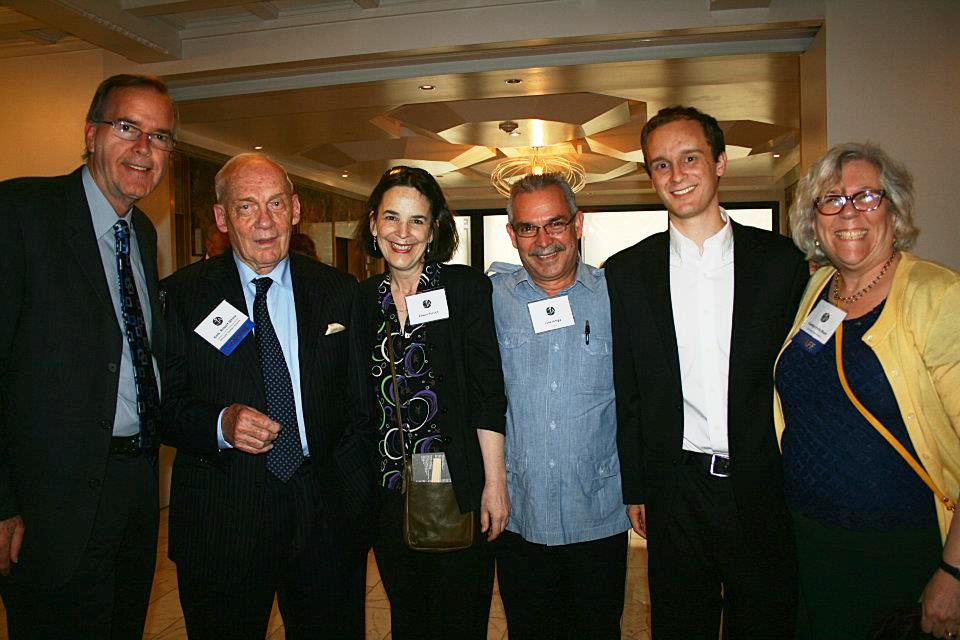
FRED ROSS JR, AMBASSADOR (EL SALVADOR) ROBERT WHITE, EILEEN PURCELL, JOSE, J. ALEJANDRO ARTIGA-PURCELL, PATTY BLUM
Our boys know the roots of their family and the roots of their names. Eileen’s father successfully defended the rights of the Japanese Americans in internment camps during WWII. Each of our sons was named for men of strong influence. Camilo Torres was a revolutionary priest in Colombia, and Camilo Cienfuego was a revolutionary in Cuba. Rutilio was the beloved martyred priest, Rutilio Grande, in El Salvador. Alejandro is named for his grandfathers.
I choose to live in the moment supporting concrete projects. I believe in accompanying people with energy when they ask for it. The key to solidarity is to respond to requests; you do not impose your values on others. You are adding another layer to the 80-90% that is already in place. My dream is to stay connected with the organized people to join them in their struggle, and to walk with them.
I hope to do spectacular actions and invite others to dream together with me. Dreaming should not be a singular effort but a participatory one to inject energy. I have ideas, but I don’t want my ideas in any project to prevail. This is true of the 2017 Romero 100th anniversary celebration I mentioned earlier. It would be nice to declare 2017 the “year of peace.” Let’s dream together about a spectacular celebration to advance a national reconciliation.
My final electrical project in high school was a three-month project working at Siemens, a German Co. which took me three months to complete. It involved connecting a panel of electrical circuits covering half a wall for a sugar cane plantation. Thousands of wires went in all different directions, and the day came for me to demonstrate my crowning achievement by flipping the ceremonial switch in front of 40 people. As soon as I hooked it up to current, it caught fire, destroying both the project and everything in its wake, including all the equipment nearby. My supervisor also got fired because he had not supervised his student, me, properly. Sometimes you can put a lot of energy into something and feel really important and your work catches fire. Let’s learn from the crisis and keep watering a tiny little plant and watch it grow.
When you hit bottom, you are free to take risks and try new things and invite others to join you. It was during the Salvadoran civil war when the Archdiocese of San Francisco and the East Bay Sanctuary Covenant began sending delegations into El Salvador and Honduras. On one occasion, the leader of one delegation at the airport ready to go said to the group, “We can’t go there; it’s a war zone.” The leaderless delegates called me and asked me what to do. I told them to proceed as planned and follow the sounds of the bombs. You do not need Spanish; just follow the bombs. They did, and it was a valuable experience none of them ever forgot. I want to invite people to feel uncomfortable doing justice.
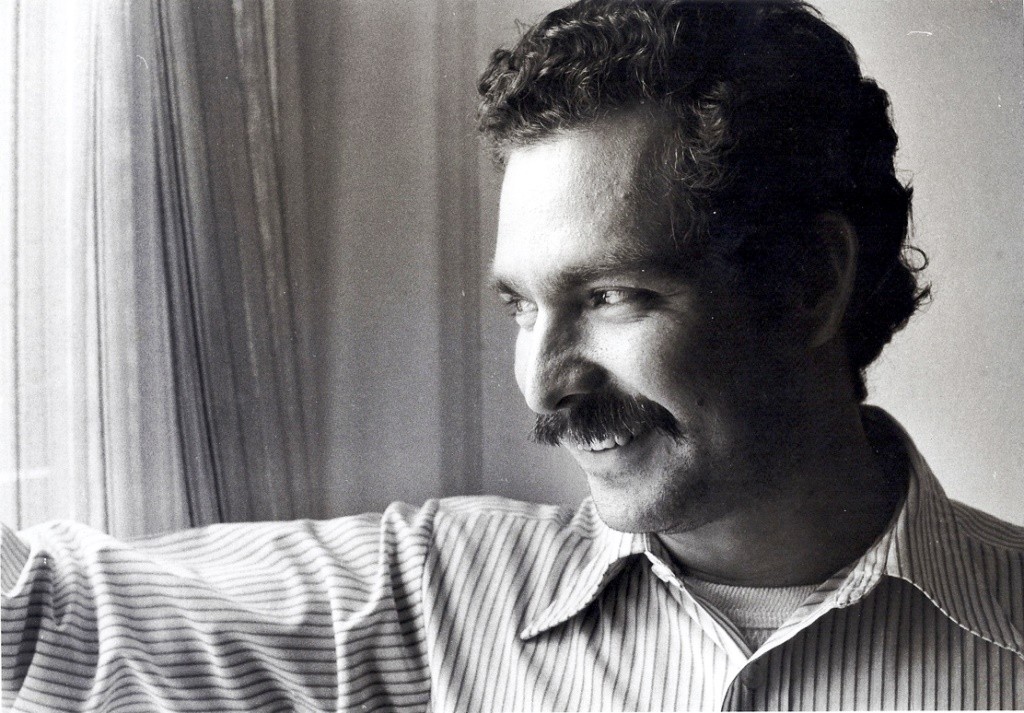
A younger Jose, always and still, looking with joyful expectation to the future.
I consider myself a palm tree. When the storm comes, I bend all the way to the sand and when the sun rises, I rise too. There are no Balsamo trees on the beach. They are too hard and break with the storm. We have to adjust to change. Each new moment is different. Doing work during the war became easy because we knew what to do. The post war and peace was difficult. Walmart and free trade are more challenging than the U.S. military. But our ancestors adjusted to the Spanish colonizers. They spoke Spanish and wanted the gold to go to Europe. Now they speak English and want the gold to go to the U.S.
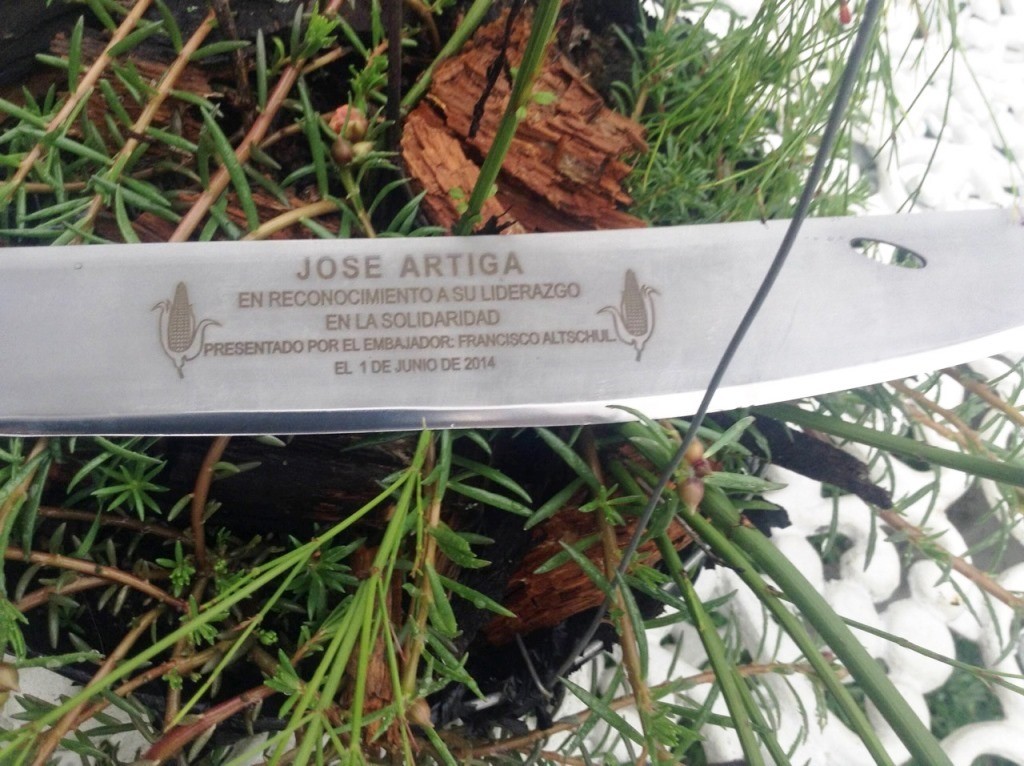
While José often works unknown and behind the scene, here, he is recognized by the Salvadoran Ambassador with a tool of the farmers – a machete.
(We ask Jose how he would like to be remembered.) There is a line of thought that you don’t want to be remembered. There is a humble monsignor in El Salvador, Ricardo Urioste, who I have greatly admired. He has survived five archbishops including Romero and he is rarely seen in photographs, but it is possible that he may have been responsible for writing some of Romero’s homilies. He prefers to work behind the scenes. In the Bible do you see any gospel books with a woman’s name? The women are largely behind the scenes. Many people working in various SHARE programs do not know me or ever see me, and there is satisfaction in that. It’s like the writer of the play who is never seen in the performance but derives fulfillment in his work performed on stage. I’ve done the play because I know it has my mark. It is the outcome in the contributions that is important, not my name.
Caroline J. Sheaffer &
Pastor Emeritus Donald J. Seiple
https://www.embracingelsalvador.org
A project of preserving oral histories of the Salvadoran people


